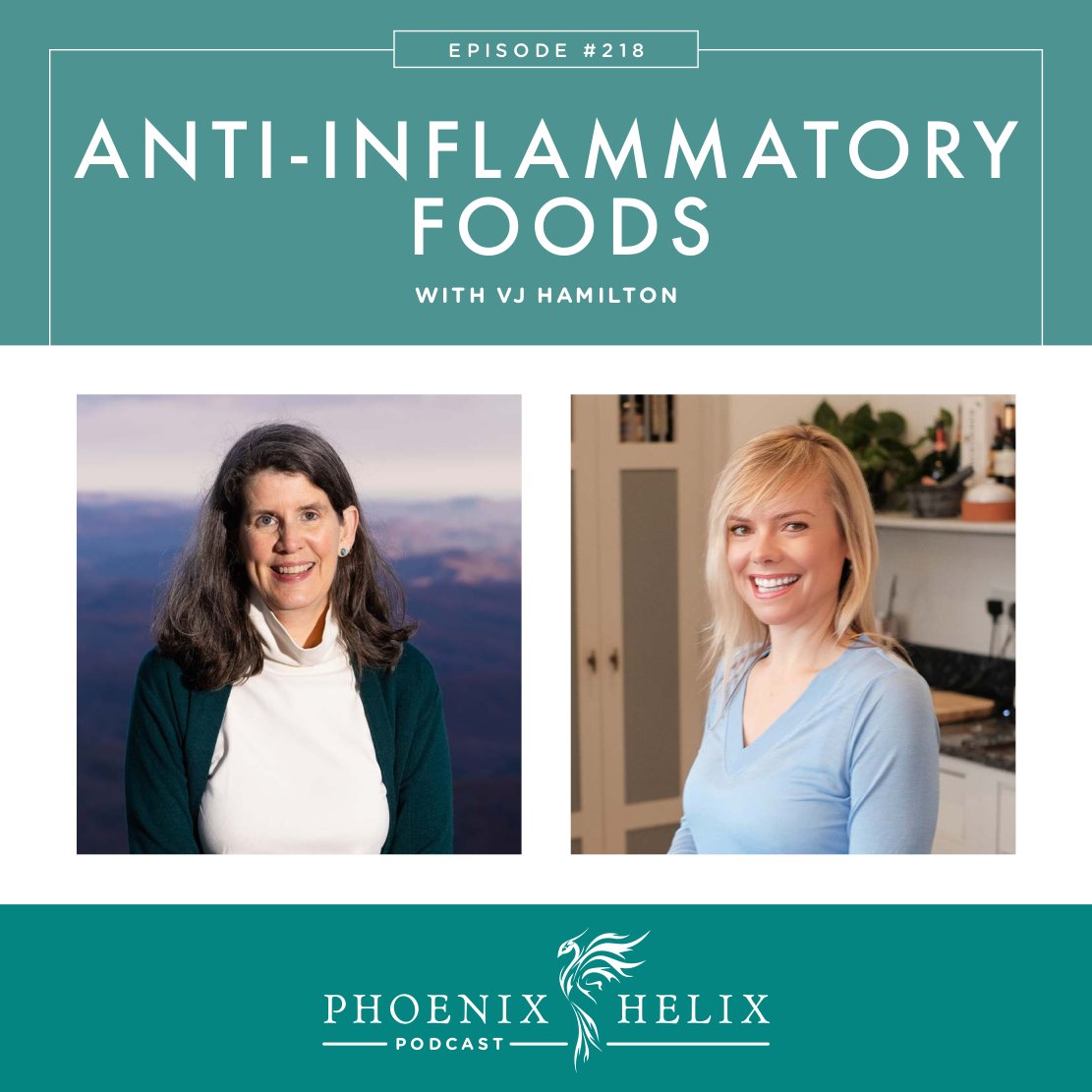Using Food As Medicine
When it comes to autoimmune disease, inflammation plays a big role. The higher our inflammation, the higher our symptoms and disease activity. Doctors know this, which is why bloodwork for autoimmune patients usually includes inflammation markers. When it comes to self-care and living well with autoimmune disease, learning how to reduce our inflammation naturally can be very helpful, and our food choices are a big part of that. Which foods have the greatest anti-inflammatory properties? That’s the focus of our discussion today. My guest is VJ Hamilton. She’s a nutritionist who has also studied immunology, and she has autoimmune disease herself. Her specialty is helping people with autoimmune disease thrive.
Listen to the Show
- Subscribe to my podcast through your favorite podcast app: iTunes, Stitcher, Google, TuneIn, Spotify, Amazon, etc.
- You can also listen to the episode right here through the player below, and if you subscribe to my newsletter you’ll get notified of future episodes.
Podcast: Play in new window | Download
Show Notes
- Intro (0:00)
- Thank You to Our Podcast Sponsor – Captain Soup (2:20)
- Captain Soup sells nutrient-dense freezer meals, designed specifically to enable the body’s healing. They only use the highest quality ingredients including locally sourced, 100% grass-fed and finished meats, wild-caught seafood, 100% organic vegetables, and bone broth made in-house from the bones and organ meat from the best grass-fed lamb in the world.
- They sell 7 flavors of soup which are paleo, keto, and Wahls protocol-compliant. 5 of those flavors also fit the elimination phase of the Paleo Autoimmune Protocol. 4 of the flavors are Low-FODMAP. And 2 flavors are GAPS-compliant.
- Here are the flavors: Classic Lamb, Dijon Lamb, Italian Beef, Classic Beef, Dijon Beef, Green Machine & Tom Kha. (Tom Kha is a seafood soup that’s available in-season.) They also have the full ingredient list for every flavor on their website.
- You can buy pre-selected variety packs or build your own custom box. They also have a nutrient-dense liver pâté that can be substituted for any soup upon request.
- Order today and get nutrient density delivered to your doorstep! Use the code PHOENIX to save $25 off your first order.
- Meet VJ Hamilton (4:04)
- VJ Hamilton is a nutritionist who specializes in helping people with autoimmune disease.
- Her first autoimmune disease (alopecia areata) appeared at age 7. She was prescribed steroid cream and her hair grew back. It was a stressful time in her life, and for the next 20 years, the alopecia would appear intermittently under times of high stress.
- Her second autoimmune disease (psoriasis) appeared when she was a teenager. She had been diagnosed with a dairy allergy as a baby, and as a teenager suddenly decided to eat a lot of dairy. The psoriasis appeared after that. Again, she was prescribed a steroid cream which helped, but giving up dairy again also helped.
- In college, she developed her biggest health challenge: chronic fatigue. At the time, her doctors thought is was caused by a virus and simply told her to rest. Fatigue became her new baseline.
- As an adult, she pursued a high-powered corporate accounting career, with long hours, high stress, and very little downtime. Her fatigue worsened to the point she go a formal diagnosis of chronic fatigue syndrome. She knew she needed to do something. That’s when she found functional medicine. She started working on the root causes behind her health issues. She did functional medicine testing and treatment, changed her diet and lifestyle, worked on emotional haling, and sought alternative medical treatments as well. The result is that she has been symptom-free for the past 8 years.
- Her change of career was partly inspired by her own health journey, but also by her brother who was diagnosed with multiple sclerosis as an adult. She pursued training in both immunology and nutrition, and now specializes in helping people with autoimmune disease.
- Food Is Just One Piece of the Puzzle (10:37)
- VJ’s personal healing story highlights an important fact: autoimmune disease has many root causes and autoimmune health requires a holistic approach. It’s not just about food. That’s why this podcast features such a wide variety of topics, and my website has resources for lifestyle, mindset, and medicine, in addition to food. So, while this episode is going to be focused on food, always remember the other pieces of the puzzle too.
- Anti-Inflammatory Foods (12:25)
- Often, in the healing diet sphere, we talk about eliminating foods that might be causing inflammation. Today, we’re focusing on the foods we want to add! I have other episodes on Detoxifying Foods and Gut Health Superfoods. Today we’re focusing on Anti-Inflammatory Foods. (And there is some overlap in these 3 food groups.)
- Oily Fish (12:54)
- Oily fish contains beneficial fats called omega-3 fatty acids, specifically DHA & EPA. They’re bioavailable (easily used by the body) and they reduce inflammation.
- There are some vegetarian sources of omega-3 fatty acids (flax and chia seeds), but they contain ALA and it’s needs to be converted by the body before it can be used, and 95% is lost in that conversion. Therefore, they don’t have the same anti-inflammatory benefit as oily fish.
- Our goal is to have a healthy balance of omega-3 and omega-6 fatty acids in the body. Omega-6 is pro-inflammatory, which sounds bad but our body needs inflammation to survive. It’s how we heal from infection and injury. It’s only a problem when inflammatory process don’t turn off. That leads to chronic inflammation. Too much omega-6 and not enough omega-3 leaves the body vulnerable chronic inflammation.
- The Modern Western Diet is very high in omega-6 and low in omega-3. Omega-6 is found in industrial seed oils like canola oil and soybean oil. Those are the oils used for cooking in most restaurants and are also ingredients in most processed foods. An easy way to reduce omega-6 fatty acids (to help restore balance) is to minimize processed foods in the diet and use healthier oils at home, like extra-virgin olive oil.
- VJ recommends eating 3 servings of oily fish each week. While most seafood contains some omega-3 fatty acids, SMASH is an acronym that helps people remember the fish that are highest in omega-3 fatty acids and lowest in mercury: Sardines, Mackerel, Anchovies, Salmon, and Herring.
- If you don’t like the taste of seafood, Eileen can relate! That was her opinion when she first developed rheumatoid arthritis. But she started eating seafood as part of her healing diet, and she was able to change her taste buds over time. Now, she loves seafood. She began with recipes that used flavors that masked the fishy flavor. Here are two favorites:
- Thank You to Our Podcast Sponsor – ShopAIP (21:20)
- Today I want to highlight their canned salmon, sardines, and anchovies. We just talked about the importance of including oily fish in our diet, and these are three fish from the SMASH acronym of top choices. ShopAIP makes it easy to keep them stocked in your pantry. The brand they sell is Wild Planet, which is always wild-caught and sustainably fished.
- ShopAIP is an online store dedicated to the Paleo Autoimmune Protocol. With hundreds of items for the elimination phase of the AIP, and products labeled by reintroduction category as well. You can find protein bars, sauces and condiments, AIP-friendly spices, cooking and baking ingredients, waffle and pancake mix, delicious snacks, and more.
- If you’re a first-time customer, use the code PHOENIX for 10% off your order. Purchase here.
- Extra-Virgin Olive Oil – EVOO (22:33)
- Olive oil has a grading system, and extra-virgin is the highest quality. It’s always cold-pressed, so no chemicals or heat are used when the oil is extracted from the olives. It also has the highest number of nutrients compared to lower grades of oil.
- EVOO is full of anti-oxidants which are anti-inflammatory. They neutralize free radicals in our body. Free radicals can cause oxidative stress which can damage the body, and oxidative stress is connected to chronic illness. Extra-virgin olive oil neutralizes these free radicals and turns off the pro-inflammatory processes. There have also been studies showing that extra-virgin olive oil can reduce inflammation in people with arthritis.
- In addition, EVOO is a monounsaturated fat, considered one of the healthiest fats. Our body needs healthy fats for many processes in the body. Fats are also building blocks for every cell membrane in the body, and fats help us absorb fat-soluble vitamins in other foods.
- EVOO has the opposite effect of the industrial seed oils we mentioned earlier (like canola and soybean oil). Those oxidize when exposed to light and heat, so when we cook with them, they increase oxidative stress rather than decrease it.
- It’s a myth that you cannot cook with extra-virgin olive oil. It actually has a high smoke point and is quite stable during cooking (much more stable than industrial seed oils). While the antioxidants are highest when consumed raw, there are still plenty of antioxidants remaining when it’s used in cooking.
- Caution: One thing you have to watch out for is olive oil fraud. Unfortunately, there’s no oversight, and brands advertised as EVOO in grocery stores often contain lower-quality olive oil, or even blends of other types of oil. Here are some tips for finding the real thing: Look for a harvest date on the bottle (not an expiration date but rather a date showing when the olives were picked and pressed). Look for a dark green bottle that protects the olive oil from light. Two brands Eileen trusts are California Olive Ranch (easy to find in a grocery store) and Calivirgin (her favorite flavor-infused oil). Some brands available in the UK that VJ likes are Ravida, Biona, and Organico. And when she was in Greece this summer, she fell in love with Pamako. If you have the opportunity to visit an olive orchard, they often do tastings of extra-virgin olive oil. It will be the freshest EVOO you’ve ever had!
- VJ recommends having some EVOO every day (1-2 tablespoons). She also recommends using a variety of healthy fats in the diet, since they each have their own benefits. She herself rotates EVOO, avocado oil, coconut oil, and ghee.
- Resources:
- Thank You to Our Podcast Sponsor – Luminance Skincare (32:38)
- Today I want to highlight their bestselling facecare trio, which includes their Delicate Cleanser, Rosewater Toner, and Deep Hydration Moisturizer. Each one of these products has over 500 five-star reviews on their website. And they have a sample kit, so you can try it yourself! The Delicate Cleanser gently and deeply cleanses your skin without drying it out. The Rosewater Toner perfectly adjusts and balances the pH of your skin. The Deep Hydration Moisturizer mimics skin’s natural oils to soothe dry skin while maintaining a clear complexion.
- Whereas conventional skincare products are full of chemicals that can hurt our bodies, Luminance is made from ingredients that nourish. Their products are natural, organic, wildcrafted, non-GMO, and gluten-free (and they’re even made in a dedicated gluten-free facility). It’s the cleanest skincare anywhere! And everything is handmade in small batches within the United States.
- They have a complete face and body care line, including cleansers, toners, moisturizers, masks, acne serum, lip balms, haircare, sunscreen, handcrafted soaps, and more.
- Order their sample kit today, and once you fall in love and want to order full-size bottles, use the code HELIX for 10% off your order. (You can also use the HELIX coupon on any Luminance product, not just the facecare trio.)
- Leafy Greens (34:13)
- Leafy greens are also full of antioxidants which are anti-inflammatory, including some that are especially beneficial for eye health.
- They also contain fat-soluble vitamins that are important for the health of our immune system (vitamins A, D, and K). Adding extra-virgin olive oil to your greens will ensure your body can absorb and use these vitamins.
- They also contain vitamin C which is a potent anti-oxidant and helpful for the immune system.
- And last but not least, they contain folate, a B vitamin that’s essential to methylation, DNA repair, and also has anti-inflammatory properties.
- The darker leafy greens tend to have the most nutrients. Some examples are arugula, spinach, chard, kale, collards, mustard greens, etc. (Click the links on each one for a recipe.)
- In addition to nutrients, every food also has some anti-nutrients, which is why it’s better to eat a wide variety of foods rather than the same ones every day. Leafy greens contain oxalates. For most people, they aren’t a problem, but if you overindulge in high-oxalate foods, they might become a problem. What is overindulgence? Terry Wahls recommends we eat 2-3 cups leafy greens daily. Sometimes people choose green drinks as a way to easily consume them. The risk is that it’s easy to drink more greens that you could ever eat. If you’re putting more greens in the blender than you would eat at a meal, cut back. Cooking greens also reduces their oxalate content, and some greens are lower in oxalate than others. For example, spinach is high-oxalate whereas arugula has no oxalate. That said, don’t fear leafy greens. For most people, they improve health, and both Eileen & VJ enjoy them in their daily diet.
- Berries (40:08)
- They are also full of antioxidants and Vitamin C which neutralize free radicals in the body.
- Berries can also help with blood sugar balance. They’re a low-sugar fruit, and they contain nutrients that help with insulin resistance. Blood sugar swings increase inflammation and autoimmune activity, so this is another way that berries have an anti-inflammatory effect.
- Like all foods, each berry has a unique nutrient, which is why it’s good to eat a variety. For example, raspberries contain nutrients with anti-viral properties. Since viruses can often be contributing factors in autoimmune disease, foods that help eliminate latent viruses can simultaneously lower chronic inflammation. And cherries contain nutrients known to reduce uric acid and the inflammation related to gout.
- VJ recommends eating 1/2 cup berries daily.
- Ginger (43:18)
- It contains a nutrient called gingerol that has potent anti-inflammatory and anti-microbial properties. It also supports digestion. It’s been used as a medicinal food for thousands of years, and it’s one of VJ’s personal favorites.
- It also contains B vitamins (thiamin, riboflavin, and niacin) as well as minerals (iron, calcium, and phosphorous). VJ has found that many of her clients with autoimmune disease are mineral-deficient, and ginger can help with that.
- Fresh ginger contains more gingerol than dried ginger, so that’s the best choice if you have access to it. However, dried ginger still contains gingerol, so use whatever form is most convenient for you.
- Ways to incorporate more ginger into your diet:
- It’s a wonderful flavor that can be added to almost any meal (dried or fresh).
- Make fresh ginger tea: grate or mince some fresh ginger root (about a teaspoonful) into your mug and pour some boiling water over it, cover and leave for 3-5 minutes. Pour through a small sieve and add raw honey to taste.
- You can also add a little ginger to a cup of bone broth before drinking it.
- You can even chew a piece of fresh ginger before a meal to stimulate digestion. (Note: this is an intense experience and not for everyone!)
- Outro (47:21)
- Connect with VJ Hamilton through her website: The Autoimmunity Nutritionist. She offers 1:1 nutrition consulting and group classes. She also hosts a podcast: The Autoimmune Reset. And on social media, find her on Instagram or join her free Facebook group.
- Eileen (your podcast host) is the author of multiple books, written to help people thrive with autoimmune disease. Learn more on the Books Page.
- If you like this podcast, follow or subscribe through your favorite podcast app. You can also subscribe to Eileen’s monthly newsletter.
- Check out the entire archive of podcast episodes.
You May Also Be Interested In
Spreading the Word
If you like the podcast, please leave a positive review in iTunes. It would mean the world to me, and also helps others find the podcast. Here are some quick instructions using your iPhone:
- If you are already subscribed to my podcast: (1) Click the purple podcast icon. (2) At the bottom of the screen, click Library. (3) At the top of the screen, click Shows. (4) Click the Phoenix Helix podcast image. (5) Scroll down the page, and you’ll see Ratings and Reviews. Scroll down a little bit more and click on Write a Review. This will bring up the review screen. Tap 5 stars (if you love the podcast), and then click in the title box, and it will bring up the keyboard. Enter a title and short review. (6) Click Send in the upper right corner. (7) Thank you! Positive reviews give the podcast a higher search ranking in iTunes, helping people find it and letting them know it’s a quality podcast and worth their time to listen.
- If you haven’t subscribed to my podcast: (1) Click the purple podcast icon. (2) In the lower right corner, click the magnifying class. (3) Type Phoenix Helix in the search box. (4) Click the podcast cover in the Show list. (5) If you’d like to subscribe, click the + sign at the top of the screen. (6) To write a review, scroll down the page, and you’ll see Ratings and Reviews. Scroll down a little bit more and click on Write a Review. This will bring up the review screen. Tap 5 stars (if you love the podcast), and then click in the title box, and it will bring up the keyboard. Enter a title and short review. (7) Click Send in the upper right corner. (8) Thank you! Positive reviews give the podcast a higher search ranking in iTunes, helping people find it and letting them know it’s a quality podcast and worth their time to listen.









Good reminders in this post. Thank you! I would like to develop a real appreciation for the taste of olive oil. I use it and have tried many high-quality (and expensive) brands but it is still something I use only because “it’s good for me.”
Tastes can change over time, but you are right that it can have a strong flavor. Have you tried flavor infused extra virgin olive oil? I use a blood orange infused EVOO on my salads and love it!
Good idea, I’ll try this. thanks!